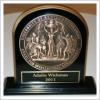by Arne Bathke
When elections are thrust into the media spotlight we are inundated by numbers, graphs, and figures. Every day, someone presents new poll results and predictions, statistical analyses, or interpretations.
Candidates are trying to find out which target group to focus on with their efforts to sway voters. Journalists want to be the first in forecasting the outcomes of important races. Political analysts and scientists strive to comprehend the underlying political and sociological movements that determine election results.
Neither group can succeed without a good understanding of statistics. In fact, knowing your stats well gives you the extra edge over your competitors.
Statistics and politics have long historical ties. The term “Statistics” derives from the Italian “statista” which means “Statesman”, and it is


















